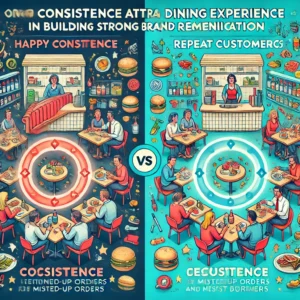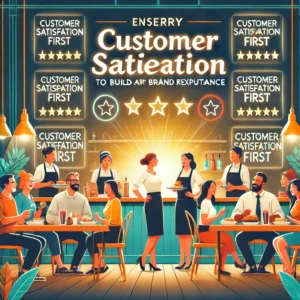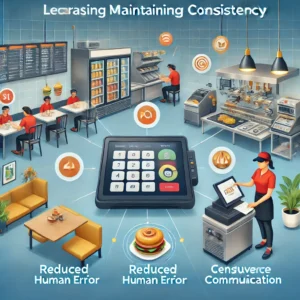The Key to Success: Consistency in Quick-Service Restaurants
- Phone: +1(833)PHX-Geek
- 712 H St NE Suite 1904 Washington, D.C. 20002
Take a look at our camera system. Get remote access to your cameras, and monitor your restaurant while you are away. Great protection for you from theft, employee grift and wrongful lawsuits.
Introduction
In the fast-paced world of quick-service restaurants (QSRs), the importance of consistency cannot be overstated. As consumers become more selective about where they dine, they expect a reliable experience with each visit. This expectation is not merely a preference; it is a necessity. When a customer orders a burger, they anticipate that it will taste the same every time they visit. This reliability fosters customer trust and loyalty.
Furthermore, a consistent dining experience helps to create strong brand recognition. Customers are likely to return to a restaurant that meets their expectations, while inconsistencies can lead to disappointment and lost business. With so many dining options available, a single negative experience can deter customers from returning. Thus, QSRs must prioritize consistency to thrive in this competitive landscape.
Ultimately, the challenge lies in delivering that consistency across various locations and teams. For a chain to succeed, every franchise must adhere to the same standards and practices, ensuring that customers receive the same quality service no matter where they are.
Management plays a crucial role in establishing and maintaining consistency within quick-service restaurants. Effective communication between management and staff is paramount to achieving a uniform customer experience. Managers must ensure that employees are well-trained and aware of the company's standards.
Moreover, management should regularly monitor performance and gather feedback from both customers and employees. This feedback loop is vital for identifying areas that require improvement. When staff members feel supported and informed, they are more likely to deliver quality service, creating a positive cycle of consistency and satisfaction.
 In addition, management must lead by example, setting the tone for the culture within the restaurant. A strong leadership presence that emphasizes the importance of consistency will resonate with the team, further enhancing the customer experience.
In addition, management must lead by example, setting the tone for the culture within the restaurant. A strong leadership presence that emphasizes the importance of consistency will resonate with the team, further enhancing the customer experience.
The impact of negative experiences on customer loyalty is significant and, according to a study by Simplr, 51 percent of customers will not return after a single unsatisfactory visit. In an age where social media and online reviews can make or break a restaurant's reputation, ensuring that every customer leaves satisfied is critical.
When customers encounter inconsistencies—be it in food quality, service speed, or overall atmosphere—they are likely to share their experiences with others. Such word-of-mouth can be detrimental to a restaurant's success, especially in a market saturated with options. In contrast, consistently positive experiences foster loyalty, encouraging customers to return and recommend the establishment to others.
Recognizing the weight of these statistics, managers and staff must work together to identify potential issues and address them proactively. Ensuring that every customer has a positive experience not only retains business but also builds a strong brand reputation in the long run.
To maintain consistency across multiple locations, quick-service restaurants should implement standard operating procedures (SOPs). These SOPs outline the expected processes for each aspect of the restaurant, from food preparation to customer service. When everyone on the team understands the standards they are expected to follow, it becomes easier to deliver a uniform experience.
Additionally, ongoing training programs are essential for reinforcing these standards. Regular workshops and training sessions can help staff stay current on best practices and address any emerging challenges. Managers should also conduct routine evaluations of each location to ensure compliance with the established guidelines.
 Finally, leveraging technology can aid in maintaining consistency. From point-of-sale systems to inventory management tools, technology can streamline operations, reduce human error, and enhance communication across locations. By investing in these resources, QSRs can bolster their efforts to provide a consistent and high-quality experience for every customer.
Finally, leveraging technology can aid in maintaining consistency. From point-of-sale systems to inventory management tools, technology can streamline operations, reduce human error, and enhance communication across locations. By investing in these resources, QSRs can bolster their efforts to provide a consistent and high-quality experience for every customer.
Conclusion
In conclusion, the key to success for quick-service restaurants lies in consistent customer experiences. By prioritizing management communication, addressing the effects of negative experiences, and implementing effective strategies, QSRs can foster loyalty and thrive in a competitive market.